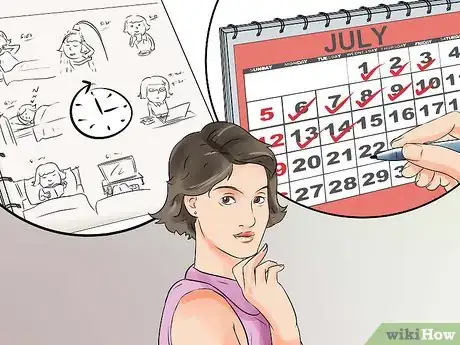This article was co-authored by Kirsten Parker, MFA. Kirsten Parker is a Mindset and Action Coach based in her hometown of Los Angeles, California. She helps high achievers overcome stress and self-doubt. She specializes in increasing one's confidence and clarity by incorporating tools from positive psychology, mindful habit change, and self-regulation into her coaching. She is a Certified HeartMath Practitioner trained in Stress, Anxiety, and Intelligent Energy Management along with Emotional Intelligence and the Science of Self-Acceptance. She also holds an MFA from Yale University School of Drama in Stage Management.
There are 14 references cited in this article, which can be found at the bottom of the page.
This article has been viewed 61,289 times.
If you have a few personal qualities that you want to change, you’re not alone – many people would like to tweak their personality a little. The good news is that your personality isn’t set in stone, and with some effort, you can change yourself for the better. However, this process will take dedication and patience, especially if you are older. You can get started by identifying which undesirable traits you want to get rid of and which positive qualities you’d like to develop to replace them. After that, you can put your new personality traits into practice until they become automatic.
Steps
Identifying Negative Traits
-
1Examine which aspects of your personality bother you. Be honest with yourself. Which of your personality traits prevent you from living the life you want?[1]
- Personality traits that get you into trouble, damage your relationships, or interfere with your productivity are probably worth trying to change.
- If you want to change more than 1 or 2 of your traits, you might find it helpful to make a list. For example, you might include traits like lying, procrastinating, or self-doubt.
- Try taking an online personality test to identify specific traits. The NEO Personality Inventory is a good option that is known for its reliability.[2]
-
2Ask a friend or family member for their opinion. When you’re talking with someone who knows you well, ask them what they think your faults are. An outside opinion may help you see yourself more objectively. It’s possible that you’re too hard on yourself, or that other people see undesirable traits in you that you haven’t noticed.[3]
- Ask someone you can trust to be honest with you. For example, you might ask, “I’m trying to improve myself. Can you can help me pinpoint a few negative traits I have that need changing?
- Only ask for another person’s opinion if you’re prepared to hear anything they have to say, positive or negative.
Advertisement -
3Figure out how negative traits affect your life. Once you know which personality traits you want to change, ask yourself why you dislike them. Write down the ways your life would be better if you didn’t have these negative qualities.[4]
- Be specific. For instance, you could write, “Because of my impulsive spending, I had to borrow money for rent twice last year. When I get my spending under control, I’ll be able to save money and rely on myself.”
- Save this paper and reread it if your motivation starts to wane.
- You may even want to make a list of pros and cons for the trait you want to change. This can help you to determine how the trait is affecting your life and the lives of those around you.
Setting Personality Goals
-
1Visualize your ideal self. Ask yourself what traits your ideal self has that you don’t possess now. These are the qualities you will work on developing to replace your negative traits.[5]
- For instance, your ideal self might be more outgoing, punctual, and tidy than you are right now.
-
2Find people who inspire you. Ask yourself why you admire certain people. Chances are good that they have some personality traits you could cultivate in yourself.[6]
- Consider people you look up to in real life as well as public figures like athletes and celebrities.
- Try reading autobiographies or watching videos about inspirational people on Youtube. This can help you to identify traits that these people possess that you admire and would like to have yourself.
-
3Ask yourself whether you can turn negatives into positives. Many traits that are often considered negative actually have some positives built into them. Look for ways to preserve the positive part of the trait while minimizing the negative part.[7]
- For instance, many shy people are good listeners, and many aggressive people make natural leaders.
-
4Choose just one or two traits to focus on at first. If you try to change multiple personality traits at once, you won’t be able to focus on any of them. Instead, select just one or two of the most important qualities you want to work on, and leave the others for later.[8]
- Choose a goal that will make your later goals easier to achieve. For instance, if one of your objectives is to stop being lazy and develop a good work ethic, it would make sense to tackle that one first over getting promoted at your job.
Changing Your Habits
-
1Create a plan. After you’ve decided on the specifics of your personality goals, figure out how you will make them happen. Brainstorm specific steps you can take to get rid of your undesirable personality traits and build your new, positive qualities.[9]
- For instance, if you want to conquer your shyness and become outgoing, you could commit to greeting one new person every day.
- If you want to stop procrastinating, you might immediately break down large projects into smaller, doable parts and then take action on at least one.
-
2Focus on a goal. Having a goal in mind for making a change can help to keep you motivated. Try to focus on the larger positive aspects of making the change rather than thinking about the negatives.
- For example, if you want to be a better public speaker, then try writing down what greater goal this will accomplish for you. Maybe being a good public speaker will allow you to become a personal coach or will be a requirement in starting your own business in the future. Write down whatever positive aspects you can think of to help motivate yourself.
-
3Be aware of your behavior. Instead of letting yourself run on autopilot, get into the habit of paying attention to your thoughts and actions. Notice which situations tend to make your unwanted personality traits come out, and develop strategies for handling these situations differently.[10]
- For instance, if you find yourself arguing when someone criticizes you at work, an alternate strategy might be to take a deep breath before you reply.
- To establish the habit of self-awareness, practice it for a week or two before you start trying to change your behavior.
-
4Use affirmations. Affirmations are statements that trick your brain into thinking you’ve already achieved your desired outcome, which helps you change your habits more quickly. This is called a “fake it til you make it” approach and it is very effective. Come up with some inspiring affirmations that reflect your goals, and repeat them to yourself several times a day.[11]
- A couple of examples of good affirmations are “I feel confident and secure in myself” and “I accept responsibility for the things I do.”
- Repeat your affirmations first thing in the morning, right before you go to bed, and whenever you have an idle moment during the day.
- Make sure your affirmations are in the present tense, not the future tense. For instance, instead of saying “I will be optimistic,” say, “I am optimistic.”
-
5Look for opportunities to practice your new behaviors. To change your personality, you’ve got to perform a new behavior over and over until it seems natural. This is a long process, so don’t miss an opportunity to practice. Seek out situations that give you the opportunity to behave differently than you’re used to.[12]
- If you want more opportunities to practice your conversational skills, for instance, you might resolve to go to lunch with your coworkers more often.
- You can also find support from friends, family, or even by connecting with new like-minded people. Try telling a close friend about your goals to help keep yourself accountable, or join a group such as by looking for a meetup in your area on Meetup.com.
- You might even consider joining a self-development organization to get help developing your new habit. For example, a very useful and well-known organization is called Landmark Education.[13] These can be expensive, but the money may be worth it depending on the importance of the new habit.
-
6Be patient. It can take months or years for your new personality to really feel like you. This is especially true if you’re over the age of 30. Stay persistent, even if you slip up or your progress is slower than you’d like. If you stick with your goals long enough, your brain will eventually forge the new connections you want.[14]
- Keep in mind that developing a new habit will come with setbacks. Try to develop a plan for dealing with setbacks to help you continue to move forward and progress towards your goals.
Expert Q&A
Did you know you can get expert answers for this article?
Unlock expert answers by supporting wikiHow
-
QuestionHow can I start speaking less and listening more?
 Kirsten Parker, MFAKirsten Parker is a Mindset and Action Coach based in her hometown of Los Angeles, California. She helps high achievers overcome stress and self-doubt. She specializes in increasing one's confidence and clarity by incorporating tools from positive psychology, mindful habit change, and self-regulation into her coaching. She is a Certified HeartMath Practitioner trained in Stress, Anxiety, and Intelligent Energy Management along with Emotional Intelligence and the Science of Self-Acceptance. She also holds an MFA from Yale University School of Drama in Stage Management.
Kirsten Parker, MFAKirsten Parker is a Mindset and Action Coach based in her hometown of Los Angeles, California. She helps high achievers overcome stress and self-doubt. She specializes in increasing one's confidence and clarity by incorporating tools from positive psychology, mindful habit change, and self-regulation into her coaching. She is a Certified HeartMath Practitioner trained in Stress, Anxiety, and Intelligent Energy Management along with Emotional Intelligence and the Science of Self-Acceptance. She also holds an MFA from Yale University School of Drama in Stage Management.
Mindset & Action Coach The key to effective listening is presence. Before entering a conversation, consciously set the intention to be present with this person. “Being present” entails making eye contact, watching body language, and listening beyond someone’s words to hear their tone. You’ll start picking up on someone’s emotional state, and listening for what they mean (not just what they say). And when you’re busy paying attention to all of these things in the present moment, what you’re not doing is the habit you’re trying to change: talking too much!
The key to effective listening is presence. Before entering a conversation, consciously set the intention to be present with this person. “Being present” entails making eye contact, watching body language, and listening beyond someone’s words to hear their tone. You’ll start picking up on someone’s emotional state, and listening for what they mean (not just what they say). And when you’re busy paying attention to all of these things in the present moment, what you’re not doing is the habit you’re trying to change: talking too much! -
QuestionHow do I practice more self-control?
 Kirsten Parker, MFAKirsten Parker is a Mindset and Action Coach based in her hometown of Los Angeles, California. She helps high achievers overcome stress and self-doubt. She specializes in increasing one's confidence and clarity by incorporating tools from positive psychology, mindful habit change, and self-regulation into her coaching. She is a Certified HeartMath Practitioner trained in Stress, Anxiety, and Intelligent Energy Management along with Emotional Intelligence and the Science of Self-Acceptance. She also holds an MFA from Yale University School of Drama in Stage Management.
Kirsten Parker, MFAKirsten Parker is a Mindset and Action Coach based in her hometown of Los Angeles, California. She helps high achievers overcome stress and self-doubt. She specializes in increasing one's confidence and clarity by incorporating tools from positive psychology, mindful habit change, and self-regulation into her coaching. She is a Certified HeartMath Practitioner trained in Stress, Anxiety, and Intelligent Energy Management along with Emotional Intelligence and the Science of Self-Acceptance. She also holds an MFA from Yale University School of Drama in Stage Management.
Mindset & Action Coach Exhale. If you recognize that you’re triggered or stressed, you need to slow yourself down so you don’t act out of reactivity. When you’re stressed, your fight or flight mode puts your amygdala in charge of your actions, which means you’re prone to less thoughtful self-control and more impulsive reactions to emotions. Exhaling activates your parasympathetic nervous system. This moves you from fight or flight to rest and digest mode, when your prefrontal cortex gets to run the show again. So taking a few breaths with a slightly longer exhale than inhale will help you regain access to the higher thinking that your prefrontal cortex is so good at. This “higher thinking” is where you tap into what really matters to you, what’s actually important in the moment, what your long-term intentions are, etc. You’ll literally give yourself access to thinking you can’t execute when you’re in stress! A big mistake people make when thinking about self-control is that they expect to be able to “talk themselves into good/smart behavior” (like “they should do better because they know better”). But when you’re in stress, that’s simply not how your brain is operating. If your amygdala is in charge, you can’t think of things like higher goals and deeper intentions. So make it easier on yourself by making the first step to self-control breathing!
Exhale. If you recognize that you’re triggered or stressed, you need to slow yourself down so you don’t act out of reactivity. When you’re stressed, your fight or flight mode puts your amygdala in charge of your actions, which means you’re prone to less thoughtful self-control and more impulsive reactions to emotions. Exhaling activates your parasympathetic nervous system. This moves you from fight or flight to rest and digest mode, when your prefrontal cortex gets to run the show again. So taking a few breaths with a slightly longer exhale than inhale will help you regain access to the higher thinking that your prefrontal cortex is so good at. This “higher thinking” is where you tap into what really matters to you, what’s actually important in the moment, what your long-term intentions are, etc. You’ll literally give yourself access to thinking you can’t execute when you’re in stress! A big mistake people make when thinking about self-control is that they expect to be able to “talk themselves into good/smart behavior” (like “they should do better because they know better”). But when you’re in stress, that’s simply not how your brain is operating. If your amygdala is in charge, you can’t think of things like higher goals and deeper intentions. So make it easier on yourself by making the first step to self-control breathing! -
QuestionHow can I stop being anxious in social situations?
 Kirsten Parker, MFAKirsten Parker is a Mindset and Action Coach based in her hometown of Los Angeles, California. She helps high achievers overcome stress and self-doubt. She specializes in increasing one's confidence and clarity by incorporating tools from positive psychology, mindful habit change, and self-regulation into her coaching. She is a Certified HeartMath Practitioner trained in Stress, Anxiety, and Intelligent Energy Management along with Emotional Intelligence and the Science of Self-Acceptance. She also holds an MFA from Yale University School of Drama in Stage Management.
Kirsten Parker, MFAKirsten Parker is a Mindset and Action Coach based in her hometown of Los Angeles, California. She helps high achievers overcome stress and self-doubt. She specializes in increasing one's confidence and clarity by incorporating tools from positive psychology, mindful habit change, and self-regulation into her coaching. She is a Certified HeartMath Practitioner trained in Stress, Anxiety, and Intelligent Energy Management along with Emotional Intelligence and the Science of Self-Acceptance. She also holds an MFA from Yale University School of Drama in Stage Management.
Mindset & Action Coach Get present! Anxiety is stress about the future: what might happen, what you could feel, all the scariest stories you can come up with. If you know you’re uncomfortable in social situations, set the intention going in to stay mentally, emotionally, and physically present. Mentally, you can stay aware of your thoughts. It’s amazing how much less powerful a stressful thought becomes when you call it out as “a thought” instead of letting your brain run wild with it unchecked. Emotionally, you can stay non-judgmentally aware of your inner state. You can even notice that you feel the emotion of “anxious” if that’s true. When you notice it without judging it, you create space to allow it. Then the anxiety can come along for the ride without defining or overtaking you. And physically, you can stay aware of your body. Feel your feet on the floor, smell the scent of the air, and become connected to the physical experience of the present moment!
Get present! Anxiety is stress about the future: what might happen, what you could feel, all the scariest stories you can come up with. If you know you’re uncomfortable in social situations, set the intention going in to stay mentally, emotionally, and physically present. Mentally, you can stay aware of your thoughts. It’s amazing how much less powerful a stressful thought becomes when you call it out as “a thought” instead of letting your brain run wild with it unchecked. Emotionally, you can stay non-judgmentally aware of your inner state. You can even notice that you feel the emotion of “anxious” if that’s true. When you notice it without judging it, you create space to allow it. Then the anxiety can come along for the ride without defining or overtaking you. And physically, you can stay aware of your body. Feel your feet on the floor, smell the scent of the air, and become connected to the physical experience of the present moment!
References
- ↑ http://operationmeditation.com/discover/overcome-negative-personality-traits-and-become-a-better-you/
- ↑ https://www.sciencedirect.com/topics/neuroscience/revised-neo-personality-inventory
- ↑ https://www.ronitbaras.com/family-matters/parenting-family/kids-personality-traits-how-to-change-them-with-awareness/
- ↑ http://www.huffingtonpost.com/beth-weissenberger/owning-your-negative-trai_b_775662.html
- ↑ http://www.essentiallifeskills.net/improveyourpersonality.html
- ↑ http://www.oprah.com/spirit/Martha-Beck-Positive-and-Negative-Personality-Traits-Perseveration
- ↑ http://lifehacker.com/top-10-supposedly-bad-personality-traits-that-can-act-1644852692
- ↑ https://www.scotthyoung.com/blog/2012/10/15/focus-not-effort/
- ↑ https://lifereimagined.aarp.org/page/signature/28771-How-to-Turn-Your-Worst-Traits-Into-Your-Best-Assets
- ↑ https://www.psychologytoday.com/blog/choke/201103/self-aware-brain-makes-it-easier-change-your-behavior
- ↑ http://www.briantracy.com/blog/personal-success/be-the-best-you-7-keys-to-a-positive-personality/
- ↑ http://blogs.psychcentral.com/childhood-neglect/2015/01/the-5-essential-steps-to-change-a-personality-trait/
- ↑ http://www.landmarkworldwide.com/
- ↑ http://nymag.com/scienceofus/2014/11/how-much-can-you-really-change-after-30.html
About This Article
If you have some undesirable personality traits, you’re not alone, but there are ways you can change them and live a more fulfilling life. Choose 1 or 2 personality traits to change at first and focus on those so you don’t get overwhelmed. Then, set small steps to gradually change your behavior. For example, if you’re withdrawn and you want to become more confident, try to start a conversation with someone you don’t know once a week for a month. Once you’ve hit that goal, set another one to help you make a little more progress. Changing your habits can take time, so be patient with yourself and keep at it. For more tips from our co-author, including how to identify your undesirable personality traits, read on.








































































